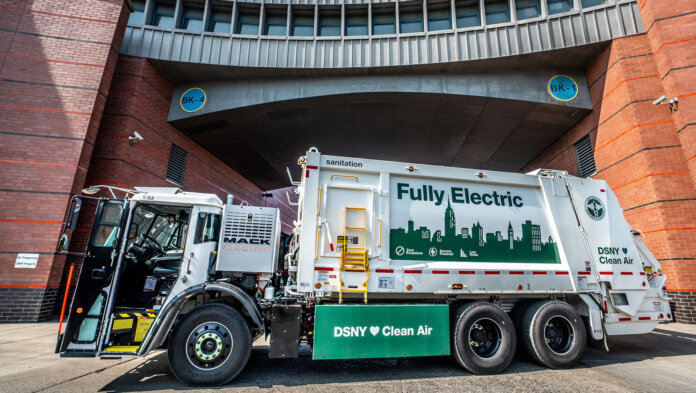Mack Trucks, a subsidiary of Volvo Group, has delivered a Mack LR Electric demonstration model to New York City Department of Sanitation (DSNY) officials, who will put it through rigorous, real-world trials.
“Mack Trucks is proud to deliver DSNY’s first fully electric refuse vehicle, the Mack LR Electric, so it can begin its in-service trial in their demanding application,” says Jonathan Randall, senior vice president of North American sales and commercial operations at Mack Trucks. “The LR Electric is equipped with Mack’s integrated electric powertrain to help DSNY achieve their greenhouse gas goals, while also offering a significantly quieter propulsion system.”
DSNY is the world’s largest municipal sanitation department, with roughly 12,000 tons of refuse and recyclables collected each day by more than 6,000 vehicles. Their collection fleet consists predominantly of Mack vehicles.
DSNY will base the Mack LR Electric demonstration model at its Brooklyn North 1 garage and conduct an in-service trial on local collection routes, evaluating operating range, payload capacity, regenerative braking and overall functionality of the electric refuse vehicle in their operations.
DSNY’s Mack LR Electric demonstrator features two 167-kW motors, offering a combined 536 peak horsepower and 4,051 lb.-ft. of torque available from zero RPM. The vehicle is equipped with a two-speed Mack Powershift transmission and Mack proprietary S522R 52,000-lb. rear axles. The truck features four NMC lithium-ion batteries (lithium nickel manganese cobalt oxide) that are charged via a 150 kW, SAE J1772-compliant charging system. All accessories on the Mack LR Electric model, including the hydraulic system for the Heil Durapack 5000 refuse body, are electrically driven through 12 V, 24 V and 600 V circuits.
Mack unveiled the DSNY LR Electric demonstrator in May 2019 and demonstrated the vehicle to DSNY officials in January at the Mack Customer Center in Allentown, Pa.
Mack says it plans to commercialize the LR Electric model in 2021, enabling customers to collect refuse in a more environmentally friendly way.





